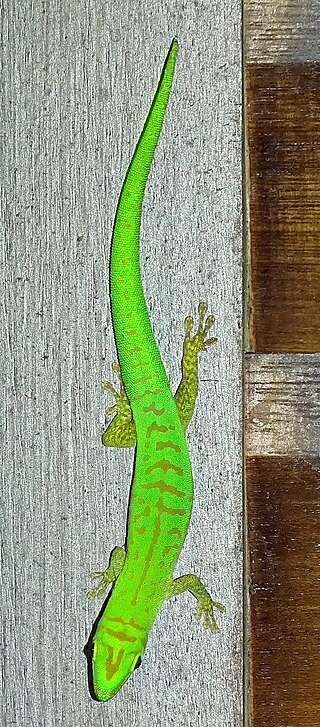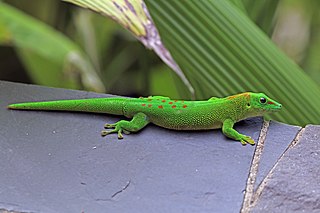
Phelsuma is a large genus of geckos in the family Gekkonidae. Species in the genus Phelsuma are commonly referred to as day geckos.

The Madagascar day gecko is a diurnal species of gecko. It lives on the eastern coast of Madagascar and typically inhabits rainforests and dwells on trees. The Madagascar day gecko feeds on insects, fruit and nectar.

Phelsuma astriata astriata is a subspecies of Seychelles small day gecko. It is a small, slender lizard with bright green colour that feeds primarily on insects. It is found on several islands of the Seychelles.

Phelsuma comorensisBoettger, 1913 is a species of geckos that lives on the island Grande Comore and typically dwells on trees. It feeds on insects and nectar.

Phelsuma dubia, also known as dull day gecko, olive day gecko, Zanzibar day gecko or green day gecko, is a diurnal species of gecko. It is about 15 centimetres (5.9 in) in length and lives on the western coast of Madagascar, in the Comoros, and the coast of East Africa. It typically inhabits trees and can also be found near human dwellings. The Dull day gecko feeds on insects and nectar.

The yellow-throated day gecko is an endangered diurnal species of gecko from eastern Madagascar. It typically inhabits rainforests and dwells on trees. This endangered species feeds on insects and nectar.
Mauritius upland forest day gecko is a diurnal species of geckos.

The speckled day gecko is a diurnal species of geckos. It lives in eastern Madagascar and typically inhabits rainforests and dwells on trees. The speckled day gecko feeds on insects and nectar.

Reunion Island ornate day gecko or Manapany day gecko is a critically endangered diurnal species of gecko. It occurs only on the island of Réunion in the Indian Ocean, typically inhabits trees, and feeds on insects and nectar.

The gold dust day gecko is a diurnal species of gecko. It lives in northern Madagascar, Tanzania and on the island of Comoros; it has also been introduced to Hawaii and other Pacific islands. It's typically seen in houses and various trees. The gold dust day gecko feeds on insects and nectar. It is commonly known as the mascot of GEICO Insurance, and also as the main character of the video game series Gex.

Phelsuma grandis is a diurnal arboreal species of day gecko. These geckos are part of the Phelsuma group, which consists of in excess of 70 species and subspecies. They are commonly referred to as the Madagascar giant day gecko, due to their large size. They are native to areas of tropical and subtropical forest in northern Madagascar, but have been introduced to several other subtropical locations outside their range. P. grandis feeds on various invertebrates, very small vertebrates, and nectars. It is bred and sold as an exotic pet.

Koch's giant day gecko is a diurnal subspecies of gecko, a lizard in the family Gekkonidae. The subspecies is native to northwestern and western Madagascar and typically inhabits trees. It feeds on insects and nectar.
Boehme's giant day gecko is a diurnal species of gecko, a lizard in the family Gekkonidae. The species is endemic to eastern Madagascar and typically inhabits rainforests and dwells on trees. Boehme's giant day gecko feeds on insects and nectar.

Seipp's day gecko is an endangered diurnal species of lizard in the family Gekkonidae. The species is native to northern Madagascar, typically inhabits rainforests, dwells on trees, and feeds on insects and nectar.

Pasteur's day gecko is a small diurnal subspecies of gecko. It lives in the Comoros and typically inhabits trees and bushes. Pasteur's day gecko feeds on insects and nectar.

Phelsuma v-nigra v-nigraBoettger, 1913 is a small diurnal subspecies of geckos. It lives in the Comoros and typically inhabits trees and bushes. Phelsuma v-nigra v-nigra feeds on insects and nectar.

Seychelles giant day gecko is diurnal subspecies of geckos. It lives on the island Praslin in the Seychelles and typically inhabits trees and dwellings. The Seychelles giant day gecko feeds on insects and nectar.
Phelsuma sundbergi ladiguensis is a diurnal subspecies of Phelsuma sundbergi. It lives on the islands Ladigue, Felicite and Cocco in the Seychelles, and typically inhabits trees and dwellings. The Seychelles giant day gecko feeds on insects and nectar.

Mahé day gecko is a diurnal subspecies of geckos. It lives on the western granite islands of the Seychelles and typically inhabits trees and human dwellings. The Seychelles giant day gecko feeds on insects and nectar.

Phelsuma astriata, the Seychelles (small) day gecko or stripeless day gecko is a species of lizard in the family Gekkonidae endemic to the Seychelles.

















